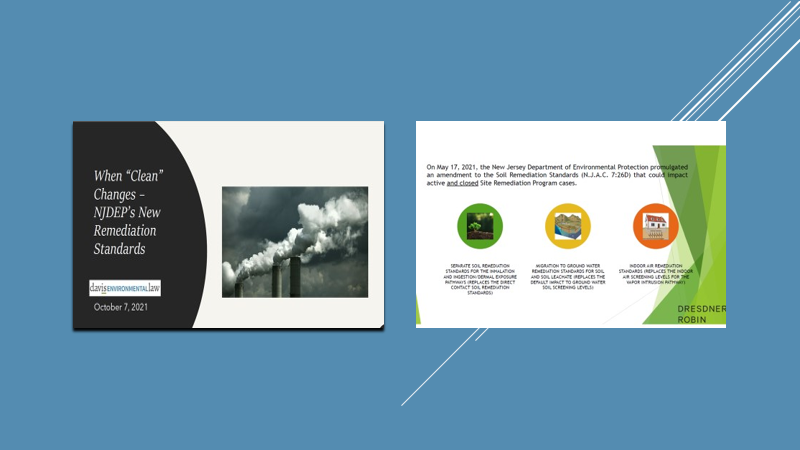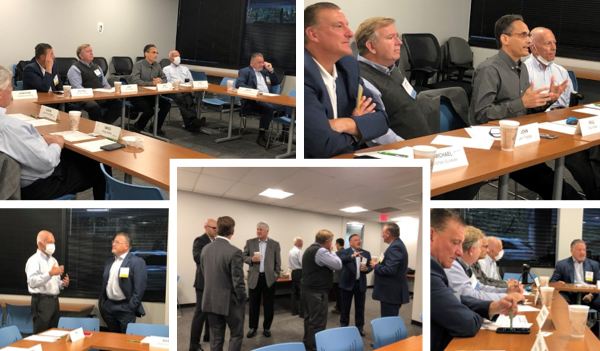Key Take Aways from Northern New Jersey’s October, 2021 Meeting
- Dresdner Robin’s Tony Ianuale and Charles Heydt described several NJ land use bills, most notably the Palisades Overlay District bill that limits building height to no taller than the Palisades; a large land use RFP in Ocean County for Army, Navy & AF military base extending over ten towns; and the stalled Sweeney regional plan bill that would have affected municipality rights.
- John Tregidgo also with Dresdner Robin reported that many firms are working to meet new environmental standards for current and emerging contaminants. Timelines required for site remediation programs, set in 2012, are due completed in 2021-2022. Companies are pushing through clean-up and final remediation documents to meet deadlines and avoid state remediation. As a member of Fairlawn’s environmental commission, John noted that the town is working on an electric vehicle ordinance for charging stations. July state legislation stipulated residential properties with five plus units provide wiring for electric vehicle charging stations.
- NAI James E. Hanson’s Scott Perkins spoke to the continued burgeoning of the industrial market, outlining several examples in the Newark port/airport and Meadowlands areas. United Airlines and others who were booted off the tarmac are still looking for new space. Amazon Industrial deals that used to be in the high teens/SF are now in the mid-to-high 20s and will likely go higher, given their dramatic growth due to changing buying/delivery patterns that are expected to continue expanding. Gregg James added that due to the continuing shift in office work to remote, office buildings are being repurposed or demolished in favor of industrial usage where rents are $20/SF net vs office rents of $18/SF gross (equiv. to $7/SF net).
- Paul Fiorilla (Yardi Systems) also addressed the growth of the industrial market, noting a new study just published by Yardi forecasts continued strong demand in this sector through 2026. He also reported on the student housing sector that continues to grow across the country, especially in areas like Florida and Texas where there is a lot of vacant land. In contrast, the northeast does not have a significant institutional housing market, due to population and building density and high cost of land. He noted that future investment in this sector will be influenced by the size of the next US student generation and percentage of foreign student enrollment.
- Paul Hacker (Axis Insurance) predicted that premiums for the Industrial segment will continue to rise based on current and predicted revenue. Post COVID, premium costs and deductibles are increasing across the country, especially for cyber insurance. Principalities have been hit especially hard with ransomware due to less expertise and older systems, requiring vendors to increase their cyber insurance.
- Constantine Siversky (Emtec Engineering) announced via chat that his firm has opened an office at One Riverside Center in Newark, a move that will facilitate work with NJ businesses.
- Paul Abramson (SolarKal) noted that the solar market has gotten a lot of traction as companies look to bolster their sustainability efforts with solar energy. He added that solar canopies for parking lots and individual garages are becoming more popular; he also expressed an interest in learning more about EV charging stations for parking lots.
- Howard Davis (Davis Environmental Law) stressed that everything is connected – evolving environmental laws and regulations, escalating property values, current and future industrial usage, emerging contaminants and new remediations, redevelopment of old brownfield sites, etc. All should be calculated and remediated to meet current and future regulations, pricing, and risks.
- Speakers John Tregidgo of Dresdner Robin and Eric Grille of Davis Environmental Law presented an overview of new NJDEP Remediation Standards, with John focusing on the technical and environmental aspects of the changes and Eric summarizing their legal implications.
- Environmental changes in the NJDEP standards affect soil and groundwater remediations as well as indoor air remediation standards. Sites that have been remediated and approved by NJDEP by 11/17/21 may only require periodic review, while those with contaminants of emerging health or environmental risk may require further investigation and cleanup.
- Legal implications for properties that may contain new or emerging contaminants may require reexamination of environmental liability protections and remediation that meet new state and federal standards.






Recent Comments